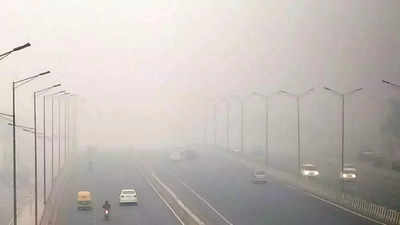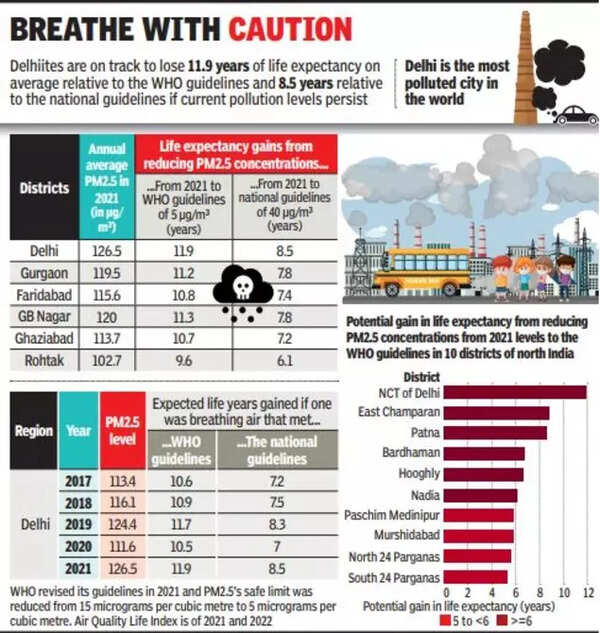- News
- City News
- faridabad News
- You are losing 11.9 years of your life to toxic air in Delhi
Trending
This story is from August 30, 2023
You are losing 11.9 years of your life to toxic air in Delhi
Air pollution is shortening lives by 11.9 years in Delhi, revealed a report on Air Quality Life Index (AQLI) released on Tuesday by Energy Policy Institute at University of Chicago (EPIC). Delhi, it added, is the most polluted city in the world.

The 2022 report, taking lockdown year 2020 as the base, said an average Delhiite would lose 10.4 years if WHO guidelines were not met

"In the most polluted region of the Northern Plains - Delhi - 18 million residents are on track to lose 11.9 years of life expectancy on average relative to the WHO guideline of 5 micrograms per cubic metre (g/m³) and 8.5 years relative to the national guideline of 40 g/m³ if current pollution levels persist," said the report.

TimesView
The fresh study is a dire warning. In 2021, studies showed that the estimated average lifespan lost to pollution was 9.7 years in Delhi. Two years later, it has climbed to 11.9 years. This only means that the city is fighting a losing battle against toxic air and the situation is getting worse. Authorities must get into mission mode and devise workable solutions, both short-term and long-term. The citizens of Delhi cannot be allowed to die by breathing foul air.
The analysis said if PM2.5 levels can meet WHO standards, life expectancy of NCR residents would increase by 11.2 years in Gurgaon, 10.8 years in Faridabad, 11.2 years in GB Nagar, 10.6 years in Ghaziabad, 9.7 years in Baghpat and 9.5 years in Rohtak.
Track the pollution level in your city
EPIC releases the impact of air pollution on life expectancy every year. The latest report takes 2021 as the base year. Delhi's PM2.5 levels were 126.5 g/m³ in 2021 as against 111.6 g/m³ in 2020 and 124.41 g/m³ in 2019. WHO revised its guidelines in 2021 and PM2.5's safe limit was reduced from 15 g/m³ to 5 g/m³.
The 2022 report, taking lockdown year 2020 as the base, said an average Delhiite would lose 10.4 years if WHO guidelines were not met.
"The estimates are worse than last year's because the annual PM2.5 levels in this analysis are higher than the previous report. It's not an indication of actual change in life expectancy from year to year, but rather a projection of how life expectancy could be affected if pollution levels remain the same, based on that year's PM2.5 data," said Christa Hasenkopf, director of AQLI and air quality programmes at EPIC.
The report said Delhi was among the seven states and UTs comprising the majority of Northern Plains - others being Bihar, Chandigarh, Haryana, Punjab, UP and West Bengal - that face the greatest health burden due to particulate pollution in the country.
Avinash Chanchal, climate campaign manager, Greenpeace India, said, "The report provides hope that meeting WHO guidelines could save billions of life years. Air pollution is one of the most significant threats to human health, and CPCB must act urgently to revise national ambient air quality standards and set ambitious targets to reduce pollutants at the source."
End of Article
FOLLOW US ON SOCIAL MEDIA










